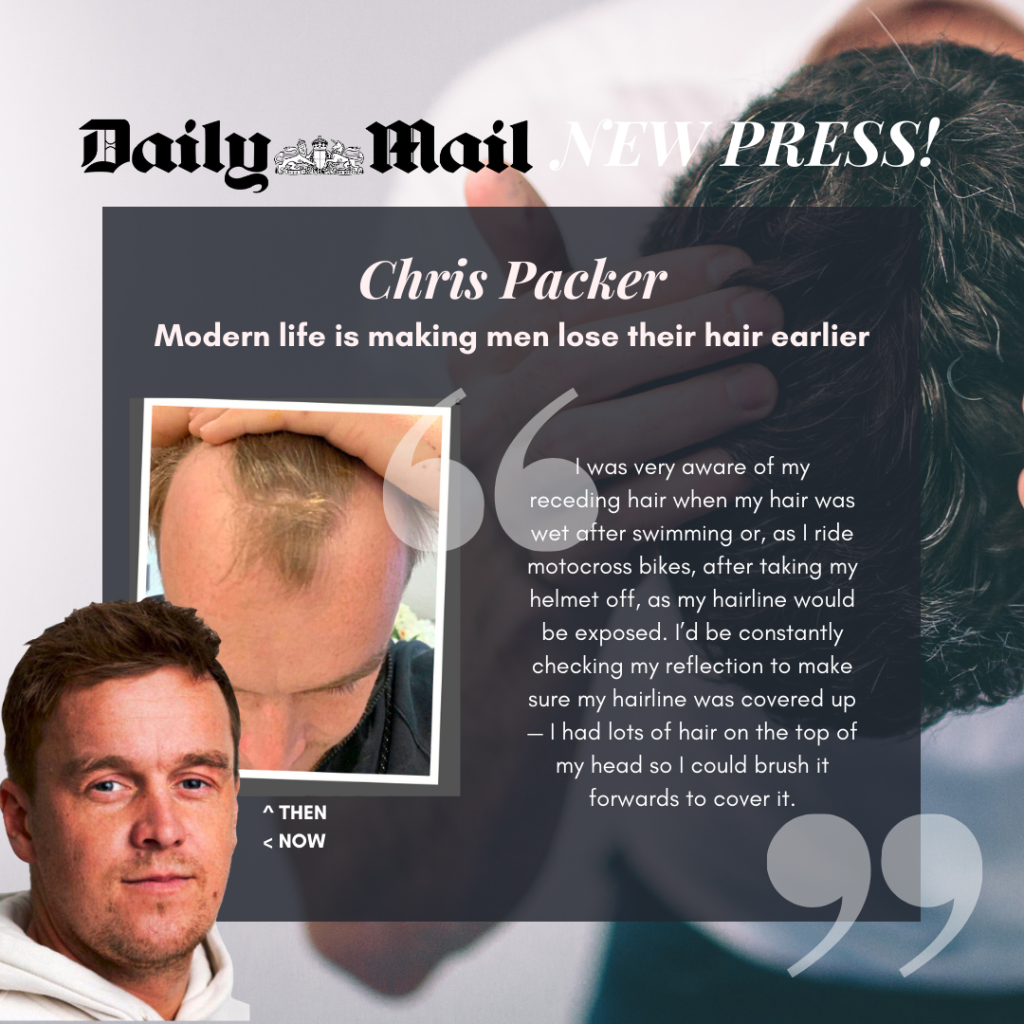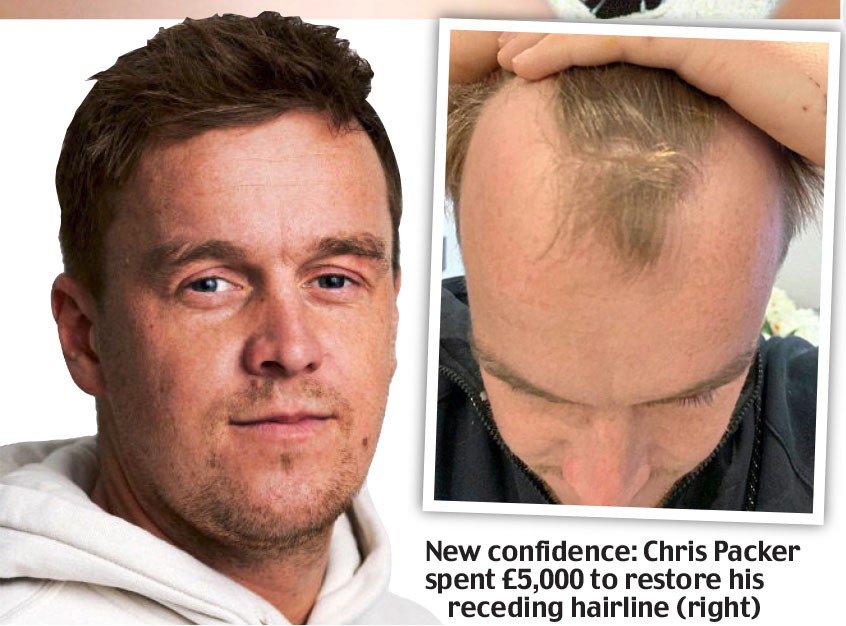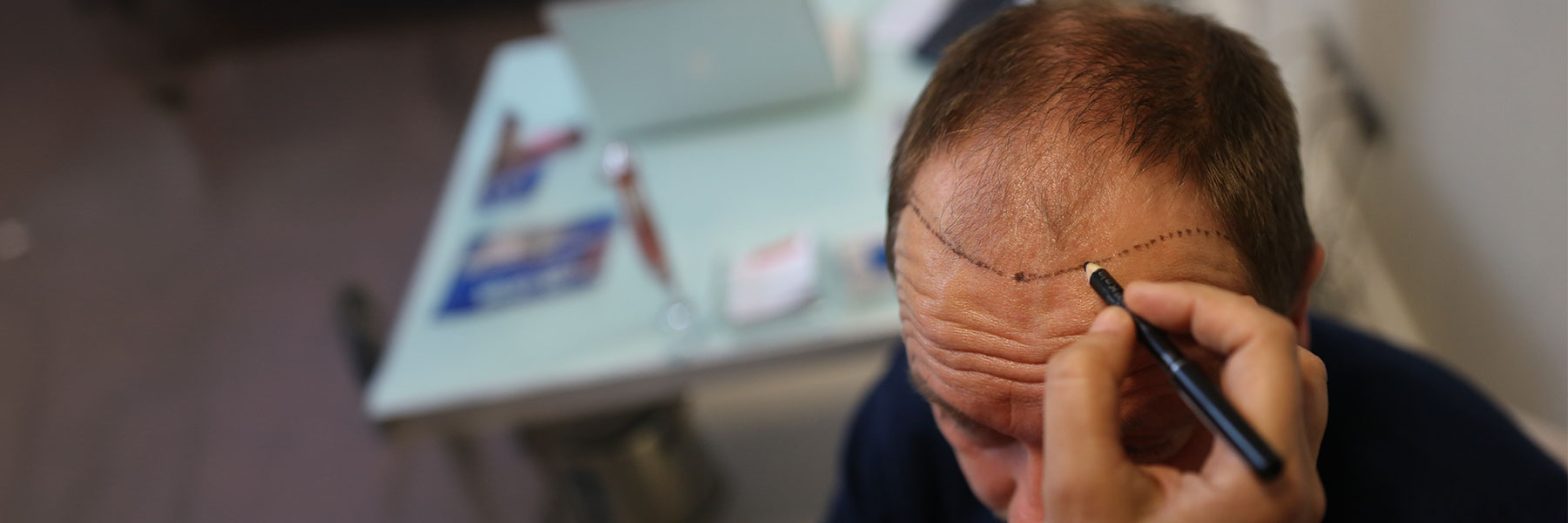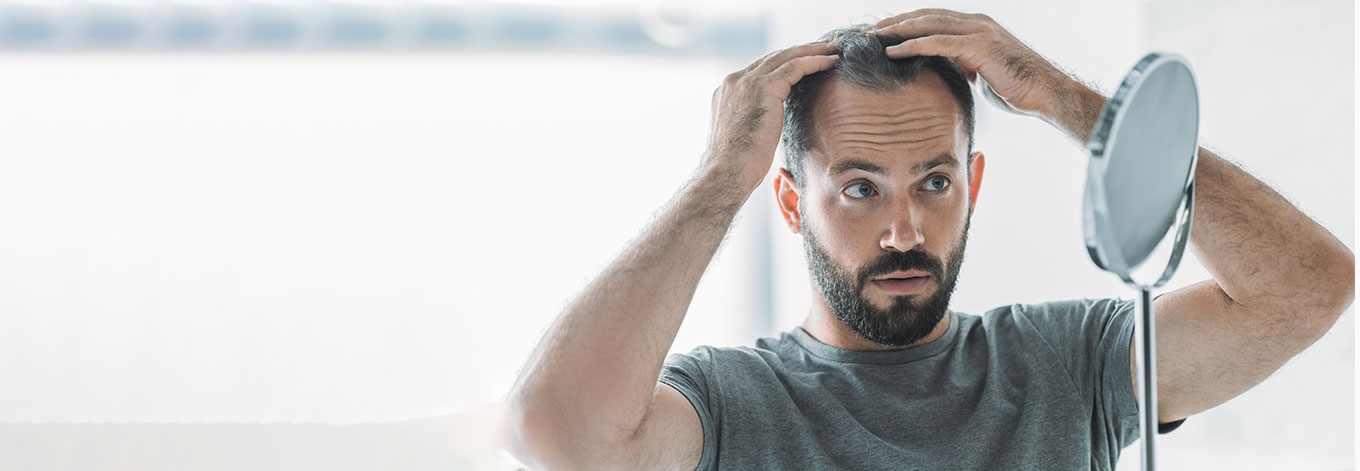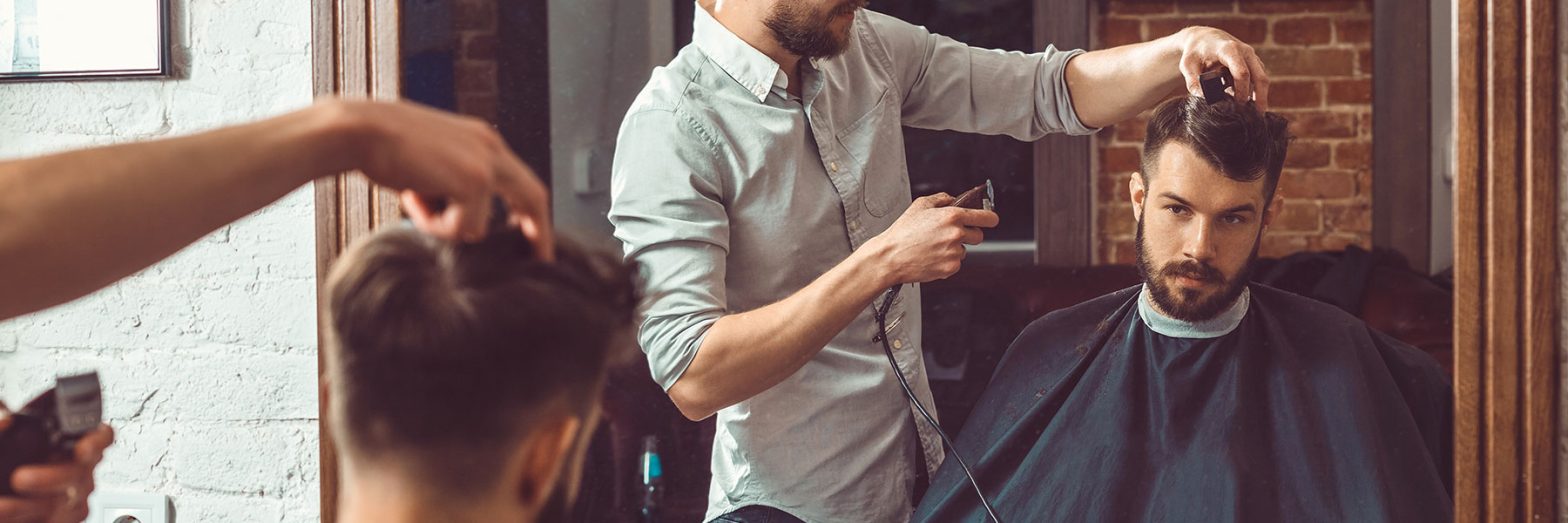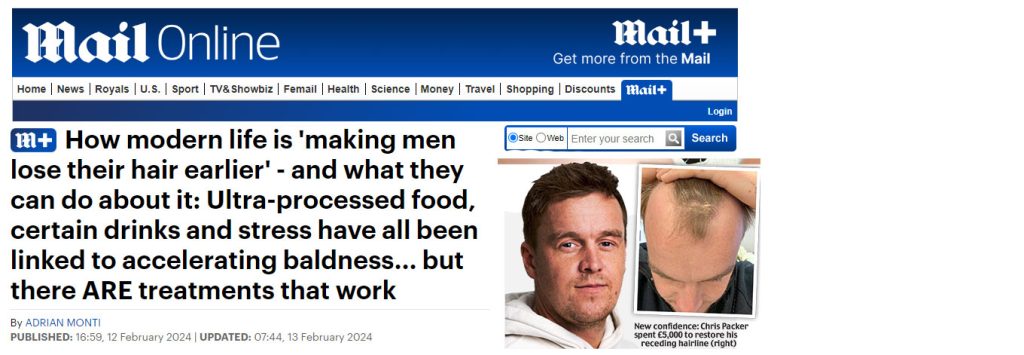
Why are so many young men losing their hair?
HAIR LOSS & HAIR TRANSPLANTS
The Daily Mail published an insightful article into hair loss, it’s causes and what treatments young men are considering.
One of our previous Hair Transplant patients, Chris Packer was featured in the article 3 years following his procedure with Mr Michael Mouzakis.
Chris’s Hair Loss History
Property Developer Chris Packer started losing his hair at a very young age, as old photos testify. “There’s a picture of me when I was about 14 playing football in the rain,” he recalls. “You can see I had a receding hairline even back then.”
“At school, some of the lads would jokingly call me ‘receder'”, says Chris, now 30, from Bristol. “It didn’t really upset me but, still, I always had hairstyles with a fringe to cover up my hairline – and I’d never have a buzz cut, although it was popular when I was at school.”
“My dad was bald by the time he got to 40, so while I wasn’t bothered about the teasing at school, I was worried I would go the same way.”
“As I got older, I thought about doing something to stop the hair loss because I didn’t want it to make me look older than I really was.”
“I was very aware of it if my hair was wet after swimming or, as I ride motocross bikes, after taking my helmet off, as my hairline would be exposed. I’d be constantly checking my reflection to make sure my hairline was covered up — I had lots of hair on the top of my head so I could brush it forwards to cover the receding hairline.”
“In my mid-20s I tried shampoo containing caffeine [said to stimulate the hair roots] but it didn’t make a difference. So I decided to take more drastic action.”
In 2020, when Chris was 27, he decided to have a FUE Hair Transplant and booked his procedure with Mr Michael Mouzakis at The Private Clinic.
What is a FUE Hair Transplant?
An FUE hair transplant involves taking hair follicles from the back of the head where the hair is fuller and rarely affected by dihydrotestosterone (DHT) which causes balding. The hair follicles are extracted from this area and implanted into areas of the scalp where the hair is thinner.
Related: Step by Step Guide to a Hair Transplant Procedure
What causes Hair Loss in Men?
It is estimated that around a quarter of men are showing signs of balding in their 20s. By the time they reach the age of 50, that figure rises to 85% of men.
The main cause of hair loss in men is male pattern baldness / androgenetic alopecia. Dermatologists have been reported to say that they are seeing increasing numbers of younger men coming to see them and that they believe this is down to men becoming more self-conscious about their appearance and treatments like hair transplants are becoming less of a taboo topic.
Androgenic alopecia is caused by androgens which are the male sex hormones such as testosterone. During puberty, testosterone is converted into another sex hormone known as dihydrotestosterone (DHT) by an enzyme called 5-alpha reductase. This continues throughout adulthood and it encourages hair growth on the body as it matures.
Some men produce more DHT due to genetic factors and this causes miniaturisation in the hair follicles causing hair in the area to be shorter and thinner. Hair from the area is also lost too quickly for the hair growth cycle to effectively replace the follicle which then results in the appearance of a balding scalp.
Hair at the front of the scalp and top of the head (crown) is much more sensitive to DHT in comparison to hair at the back of the head which is resistant to it.
Related: Male Pattern Baldness in Focus: How DHT Affects Hair Loss
Can lifestyle factors contribute to hair loss?
A study published by the journal Nutrients suggested that young men who consume sugary drinks 7 times a week are three times more likely to develop male pattern baldness than those who do not consume them at all.
Excessive sugar consumption can impair the body’s metabolism which as a result can affect the processes within hair follicles which are required for its repair and growth.
Another study carried out in Turkey in 2021 concluded that students with moderate to severe androgenetic alopecia had a higher body mass (BMI) index and waist circumference than those who were only affected mildly.
The researchers writing in the Italian Journal of Dermatology and Venerology concluded that “Regulation of lifestyle and dietary habits may have a contribution in the prevention of early-onset androgenic alopecia.”
Does smoking cause hair loss
Another lifestyle factor, smoking is also thought to increase your risk of male pattern baldness. In a study by Al Azhar University in Cairo, Eygpt found that of the 1000 20-35 men that they studies, the majority of those who smoked had some form of androgenetic alopecia. It was thought that nicotine and other chemicals are likely to be responsible for accelerating it by damaging the hair follicles and encouraging cellular ageing and hormonal effects.
Can stress cause hair loss?
A longer-established factor for hair loss is stress. Cortisol is released by the body when we are stressed but high levels of cortisol can disrupt the hair growth cycle making the hair follicles shed faster and existing strands of hair to become thinner.
So whilst many lifestyle factors can contribute to hair loss, overall – male pattern baldness / androgenetic alopecia is heavily determined by genetics. If you have a strong genetic predisposition, then you are more likely to develop hair loss despite lifestyle modifications. Whilst eating healthier and stopping smoking for example can help to slow the process, some form of hair loss is still likely to occur.
Can you cure hair loss?
There is no treatment or cure for hair loss but there are many effective treatments that can help to reduce it.
Medication
Medications such as minoxidil and finasteride are two types of US Food and Drug Administration (FDA) approved and medically-proven hair loss products. However, these medications should not be taken or used by anyone under the age of 18. They will also need to be taken/used for the rest of your life in order to maintain the results which is a big commitment for many young men.
Hair Transplant
Hair Transplants are a very popular and effective procedure for many men experiencing hair loss and the benefit is that they can provide long-lasting results. However, having a hair transplant procedure too young often means that your rate of hair loss is not yet established. You are more likely to require multiple procedures throughout your lifetime putting you at risk of your donor area running out of viable hair follicles to transplant.
Mr Mouzakis says that in around 30 per cent of cases, patients need a revision hair transplant after 10 to 15 years, especially if they had their first one when they were younger. Patients may be advised to use topical minoxidil to maintain their transplanted hair in the best condition.
“In some patients, the hair follicles can fall out in the weeks after, before being replaced by new ones, which is normal. Full results can be seen after six to 12 months” says Michael Mouzakis, a consultant plastic surgeon at The Private Clinic of Harley Street in London who performed Chris’s hair transplant.
Related: Am I too young for a Hair Transplant?
Related: Young Men and Hair Transplants
Hair Transplant Results
It took a year for Chris’s hair to regrow fully after his two-and-a-half-hour transplant procedure.
Chris followed up with “After the local anaesthetic to numb my head, I didn’t feel a thing, nor did I suffer any pain.” he says. “At first my scalp was itchy while the scabs healed. luckily it was done during lockdown, so I didn’t have to see people while it was settling down.”
“The hair started coming through straight away, then fell out before it came softer, and it’s been great ever since. It was well worth the cost, as it’s given me an inner confidence I had lacked before.”
Related: FUE Hair Transplant Results after 3 Months
Hair Loss Options at The Private Clinic
We offer a range of hair loss solutions at our clinics including:
- FUE Hair Transplants for Men
- FUE Hair Transplants for Women
- Hair Loss Medication
- Non Surgical Hair Loss Treatment
- Calecim Hair Loss Treatment
- Micropigmentation
- Female Hair Loss
- Hair Loss & Thinning
To find out more about hair loss procedures at The Private Clinic, please contact 0333 920 2471 or you can use our online contact form to request a call back.





